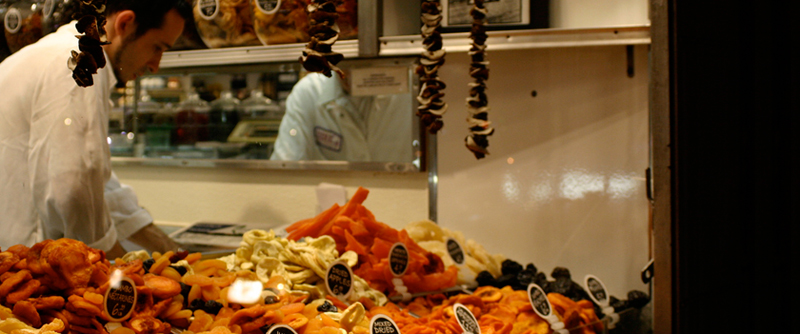Looking southeast from Houston Street, a large residential tower screams from the skyline of stout tenements that surround it on Norfolk Street. The luxury apartments were constructed on land formerly used as a parking lot by Ratner’s dairy restaurant on Delancey Street. The Harmatz family, who owned Ratner’s, sought out developers when it decided to close the restaurant, and the result is an overtly modern, bright blue structure that is impossible to miss. The BLUE condominium was designed by Bernard Tschumi, former Dean of Architecture at Columbia University, and a one-bedroom apartment sells for more than $1.2 million. On the website promoting BLUE, Russ & Daughters holds a place on the map of local attractions. The building’s story shows the path that Federman’s family could have taken, and didn’t.
Ratner’s was a fixture on Delancey Street for generations, serving kosher dairy—that is, no meat, since Jewish dietary laws forbid eating it in the same meal with milk. Locals favored blintzes and potato latkes, braving the sometimes abrasive waiters for the treats. The restaurant was open 24 hours a day during the 1970s, but in the late 1990s, business took a downturn as the neighborhood became more attuned to the needs of New York nightlife. In 1997, the Harmatz brothers, and third generation owners of the establishment, Fred and Robert, opened a nightclub in a back alley of the restaurant and called it Lansky Lounge, after legendary Jewish gangster Meyer Lansky. Tapping into a new generation of well-heeled fun-seekers who were increasingly flocking to the Lower East Side for nightlife, the martini bar was mildly successful and inspired a complete renovation of the Ratner’s side of the business. Ratner’s introduced non-kosher food — even cheeseburgers and seafood. The dairy restaurant and its separate kitchen began to open on Sundays only.
But once Ratner’s embraced the new Lower East Side, there was no going back. The dairy restaurant closed in late September of 2002. Three years later, the Harmatzes sold the site of Ratner’s to the developers of BLUE for $5.8 million in March of 2005. In 1905, they could have bought the whole neighborhood for that.
Russ & Daughters’ location puts the fish family at the eye of the development hurricane on the Lower East Side. It’s not for lack of opportunity that Federman and her relations haven’t followed the Harmatz family’s path. “We get calls from developers and agencies asking us if we want to sell at least twice a week,” Federman says.
But selling doesn’t make sense to the Russ family, least of all to Federman and Tupper, who have devoted themselves completely to running the business right. The two wear all the hats of business owners, salmon slicers, order takers, bakers; wherever there is need at any given moment, the two fourth generation fish protégés step in and excel.
“If we didn’t own the building, chances are we wouldn’t be here,” Federman says. “But this shop will always stay. And it has to stay. For one, because this is where we started. But also, if Russ & Daughters were to leave, it would be another loss for the neighborhood.”
Though she doesn’t name them, her comments allude to the Second Avenue Deli, which was priced out of the East Village in early 2006, and the rumors surrounding the possible sale of Katz’s Delicatessen—one of Russ & Daughters’ neighbors. (The Second Avenue Deli recently reopened on Third Avenue, further uptown.) Although all three are family-operated Jewish landmarks of Lower Manhattan, Katz’s has been a tourist destination for more Americans due to its fame—from movies like When Harry Met Sally—while Second Avenue Deli was favored among celebrities. Russ & Daughters is not a sit-down restaurant, and it has never appeared in the public eye in the same way Ratner’s, Katz’s, or the Second Avenue Deli have. Instead, it endures through word of mouth, and familial connections from generation to generation.
Federman has no complaints about how Russ & Daughters fits in with the current Lower East Side vibe.
“Business is good,” she says.

